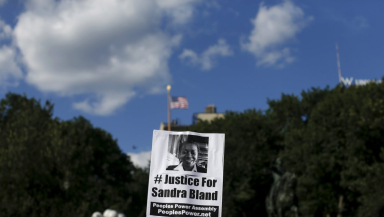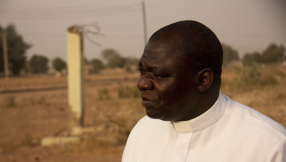
Women have been all over the news this week. Go, women! Making headlines and... what's that? It's not what you'd call good news? Ah. Highlights include: being bossy, being props in a sex-and-drugs sting, being dead, being mutilated, and, being dead again. Uplifting stuff. Even the Mail's 'sidebar of shame' manages to stick mostly to the flaunted curves and moribund relationships of the living.
So, to bossy first. Tesco has announced changes to that first-world blight, the self-checkout. "Unexpected item", those words with the capacity to send serene shoppers into seething rage, will be heard no more. Responding to feedback that the voice is "shouty", "irritating", "scolding", "shrill", even "nagging" Tesco reassured the overwhelmed that the new voice will be "less talkative." And, by complete coincidence, male (generally less risky than having a woman spoil things for herself and everyone else by saying words, according to this research). Depart from us, bossy (a word rarely applied to men) lady-talker, enter friendly fellow who just wants you to have a good day. Rumours female staff will only be allowed to communicate through semaphore lest they trigger anyone's mummy issues while directing them to the quinoa remain unconfirmed.
A chap with more to say than Mr Helpful is ex-Lord Sewel. Chillaxing across mainstream media in lingerie and leather, partaking (allegedly) of class A substances and sex workers, the former peer shared unflattering opinions of colleagues including the Prime Minister and Mayor of London, with women he had just met / paid for with Parliamentary allowances, unaware he was being recorded. Responses to the sting ranged from mild outrage to gentle eye-rolling about an 'old rogue'. His disparaging remarks about Asian women – Asian prostitutes, specifically – made to other women paid for their time and services, after he had placed face-down a picture of his wife, suggest women are very important to his ex-lordship, even if they do seem to be interchangeable receptacles for his, er, external processing.

At least the sex workers getting Lord Sewel's attention are alive. Mark Palmer-Edgcumbe, one-time head of diversity and inclusion at a global company, has turned his attention to the creation of what has been billed as "the finest sex worker murder museum in all of London!" (astonishingly not its official name). In 2014 planning permission was granted for a museum celebrating the lives and activism of East End women through the ages. Somewhere along the way Mr Palmer-Edgcumbe had an epiphany. Women who could breathe, speak, move and campaign to change their communities and lives? Who's going to want to see that?! Surely speculating about what it would feel like to be brutally murdered simply for being female would be a much more fun and educational day out. "We did plan to do a museum about social history of women but as the project developed we decided a more interesting angle was from the perspective of the victims of Jack the Ripper," he said, including "why and how the women got in that situation in the first place." Good thinking, Mark. Who wants to spend money, in these times of austerity, seeing inspiring stories of living women when there's an opportunity to gaze upon grainy autopsy pictures of dead women who have never been allowed to rest in peace, and wonder how they got themselves into it?
Today, women all around the world still face violence and untimely death, often unnoticed. The fifth case within a month of a black American woman dying in police custody – and the increased risks to black women – has received global attention only because of the persistent awareness-raising of online activists. The end of the British school year is now notable as the time young girls will be taken overseas for FGM ("cutting season") and forced marriage. With research suggesting more than 100,000 girls and women living in England and Wales have been subjected to FGM in their early lives, this is a huge social and medical issue but one often hidden. The ongoing plight of women terrorised by Boko Haram and ISIS, and the long-standing violence and exploitation facing women displaced by war now living in refugee camps are only occasionally newsworthy. These are huge issues affecting millions of women, so does it matter whether the voice telling us to pick up our shopping is changed because it's a "bossy" female? Or whether the response to an old man using public money to pay for sex is a sly pat on the back, "birds" being viewed as permissible treats for a man growing old disgracefully? Or whether London's latest tourist attraction celebrates the deaths rather than lives of women?
It matters. Every time women are quietened or silenced, reduced to a transaction, commodity or prize, it reduces our value in the eyes of the world. To be considered more "interesting" dead than alive is not surprising in a media age that bombards us with images of glamourised violence and decorative sexuality (for a glimpse into the murk of TV and film casting click here at your peril) and doesn't listen to what women say. The stark cover of this week's New York magazine shows 35 women who allege sex crimes against a famous man over a 50-year period who were disbelieved or intimidated at the time. It can not be assumed responses would be any more enlightened now. If we really believe women are created equal, the global war over our God-given value and identity must be fought with new passion every day. Respect and safety can not be optional extras. There is good news for women but it is often buried under media messages that deny our worth. We have a blueprint for a better way, a counter-cultural message that restores dignity and hope. The world needs it now more than ever.
Vicky Walker is a writer, among other things. Her book 'Do I have to be good all the time?' about the meaning of life, love and awkward moments is available now. Follow her on Twitter.














